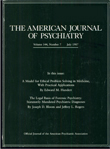Compliance Complications in Cardiac Patients
TO THE EDITOR: The article by Ranjit C. Chacko, M.D., and colleagues (1) on psychiatric and psychometric predictors of heart transplant survival confirms and extends findings that we reported in 1995 (2). By using prospectively rated psychiatric, social, and demographic data obtained before the transplant, we evaluated the impact of a number of psychosocial variables on mortality, rejection episodes, and compliance in 75 heart transplant recipients followed for a mean of 13.9 months. We identified substance abuse history, personality disorder, and the psychiatrist's global rating of risk for posttransplant psychosocial problems that affect management (a measure that incorporated qualitative dimensional ratings of coping and social support along with a number of other items) as factors strongly associated with posttransplant noncompliance and the number of rejection episodes. However, mortality was not significantly associated with any of the variables we studied, which was not surprising given the limited cumulative mortality in a study with brief follow-up and limited group size.
Because of its design the study by Chacko et al. might be characterized as hypothesis generating rather than hypothesis testing. A prospective study of the identified coping, support, and psychiatric diagnostic factors in a new cohort would be invaluable. Nevertheless, as the authors note, the results to date provide important confirmation for the “medical” value of psychiatric and psychosocial assessment of heart transplant candidates. In doing so, they also heighten the need to establish that targeted psychosocial interventions with high-risk patients can have a beneficial effect on outcome. Otherwise, because of the societal pressures on transplant programs to maximize outcomes, these findings may be used punitively to exclude some dying patients who might benefit from life-saving treatment. Many patients already view the psychiatric evaluation before the transplant as a test that must be passed to gain access to the procedure. We can hardly expect candor from our patients if we are not in the position of trying to help them in their struggle to survive.
1. Chacko RC, Harper RG, Gotto J, Young J: Psychiatric interview and psychometric predictors of cardiac transplant survival. Am J Psychiatry 1996; 153:1607–1612Google Scholar
2. Shapiro PA, Williams DL, Foray AT, Gelman IS, Wukich N, Sciacca R: Psychosocial evaluation and prediction of compliance problems and morbidity after heart transplantation. Transplantation 1995; 60:1462–1466Google Scholar



